Serving 872 students in grades 9-12, Randleman High School ranks in the bottom 50% of all schools in North Carolina for overall test scores (math proficiency is bottom 50%, and reading proficiency is bottom 50%).
The percentage of students achieving proficiency in math is 45-49% (which is lower than the North Carolina state average of 51%). The percentage of students achieving proficiency in reading/language arts is 50% (which is equal to the North Carolina state average of 50%).
The student:teacher ratio of 17:1 is higher than the North Carolina state level of 15:1.
Minority enrollment is 41% of the student body (majority Hispanic), which is lower than the North Carolina state average of 57% (majority Black and Hispanic).
Quick Stats (2025)
- Grades: 9-12
- Enrollment: 872 students
- Student:Teacher Ratio: 17:1
- Minority Enrollment: 41%
- Graduation Rate: 85-89% (Top 50% in NC)
- Overall Testing Rank: Bottom 50%
- Math Proficiency: 45-49% (Btm 50%)
- Reading Proficiency: 50% (Top 50%)
- Science Proficiency: 35-39% (Btm 50%)
- Source: National Center for Education Statistics (NCES), NC Dept. of Education
School Overview
Randleman High School's student population of 872 students has stayed relatively flat over five school years.
The teacher population of 50 teachers has stayed relatively flat over five school years.
Grades Offered
Grades 9-12
(offers virtual instruction)
(offers virtual instruction)
Total Students
872 students
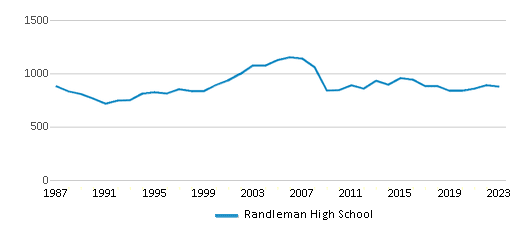
Gender %
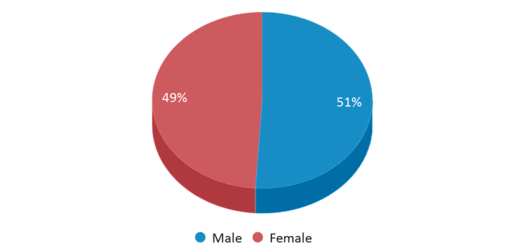
Total Classroom Teachers
50 teachers
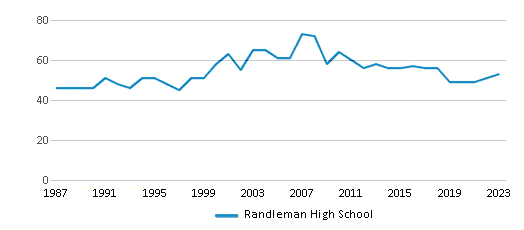
Students by Grade
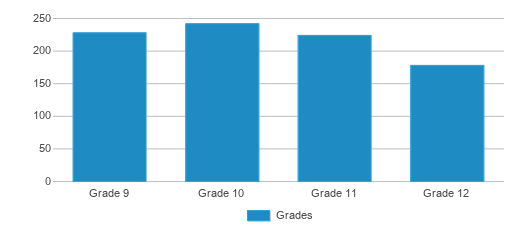
School Rankings
Randleman High School ranks within the bottom 50% of all 2,617 schools in North Carolina (based off of combined math and reading proficiency testing data).
The diversity score of Randleman High School is 0.57, which is less than the diversity score at state average of 0.71. The school's diversity has stayed relatively flat over five school years.
Overall Testing Rank
#1333 out of 2617 schools
(Bottom 50%)
(Bottom 50%)
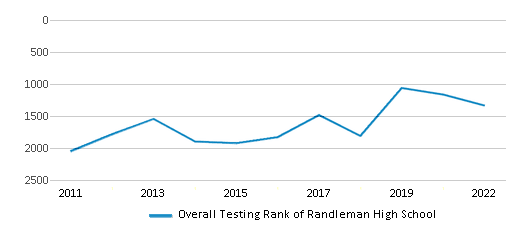
Math Test Scores (% Proficient)
45-49%
51%
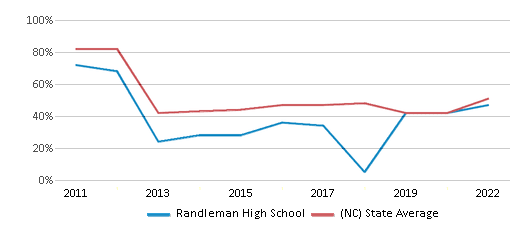
Reading/Language Arts Test Scores (% Proficient)
50%
50%
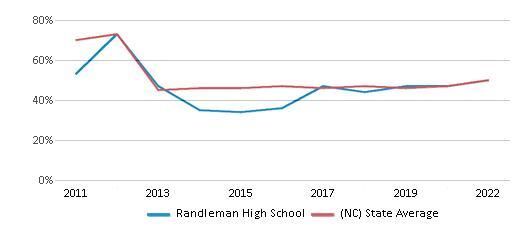
Science Test Scores (% Proficient)
35-39%
63%
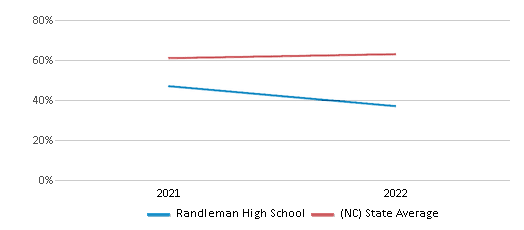
Student : Teacher Ratio
17:1
15:1
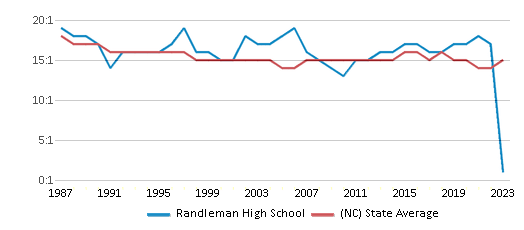
American Indian
n/a
1%
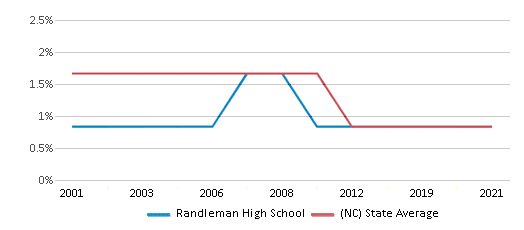
Asian
n/a
4%
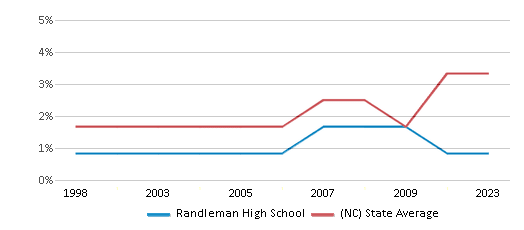
Hispanic
29%
21%
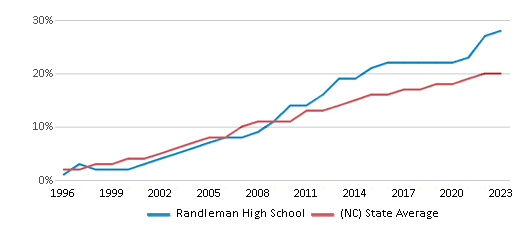
Black
6%
25%
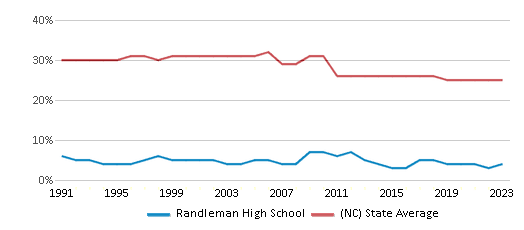
White
59%
43%
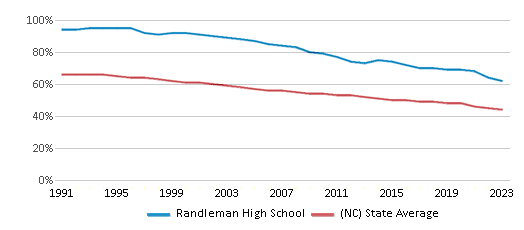
Hawaiian
n/a
n/a
Two or more races
6%
6%
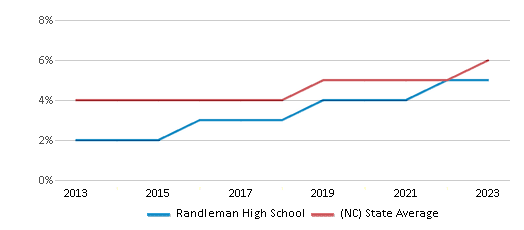
All Ethnic Groups
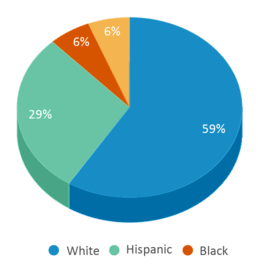
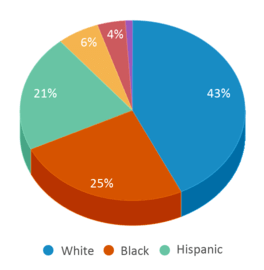
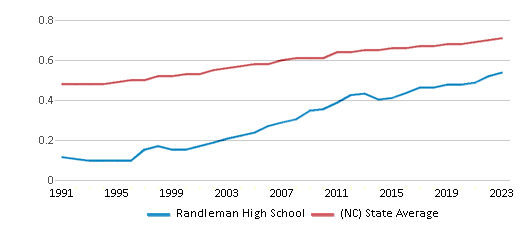
Graduation Rate
85-89%
86%
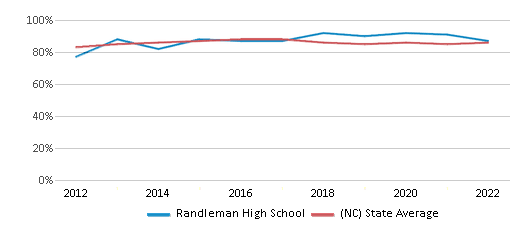
Participates in the National School Lunch Program (NSLP)
Yes
Eligible for Free Lunch
55%
68%
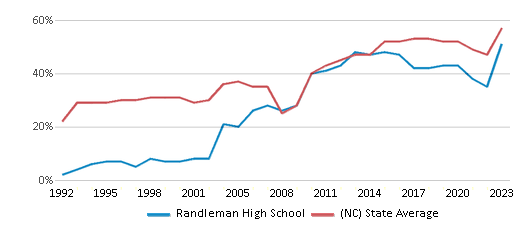
Eligible for Reduced Lunch
4%
1%
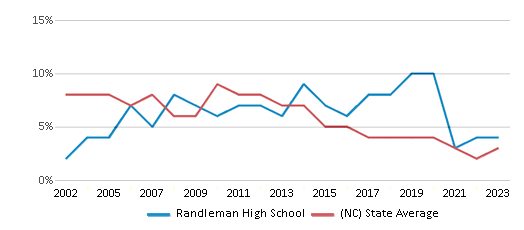
School Statewide Testing
School District Name
Source: National Center for Education Statistics (NCES), NC Dept. of Education
Profile last updated: 02/09/2025
Frequently Asked Questions
What is Randleman High School's ranking?
Randleman High School is ranked #1333 out of 2,617 schools, which ranks it among the bottom 50% of public schools in North Carolina.
What schools are Randleman High School often compared to?
Randleman High Schoolis often viewed alongside schools like Wheatmore High School, Trinity High School by visitors of our site.
What percent of students have achieved state testing proficiency in math and reading?
45-49% of students have achieved math proficiency (compared to the 51% NC state average), while 50% of students have achieved reading proficiency (compared to the 50% NC state average).
What is the graduation rate of Randleman High School?
The graduation rate of Randleman High School is 85-89%, which is lower than the North Carolina state average of 86%.
How many students attend Randleman High School?
872 students attend Randleman High School.
What is the racial composition of the student body?
59% of Randleman High School students are White, 29% of students are Hispanic, 6% of students are Black, and 6% of students are Two or more races.
What is the student:teacher ratio of Randleman High School?
Randleman High School has a student ration of 17:1, which is higher than the North Carolina state average of 15:1.
What grades does Randleman High School offer ?
Randleman High School offers enrollment in grades 9-12 (offers virtual instruction).
What school district is Randleman High School part of?
Randleman High School is part of Randolph County School System School District.
School Reviews
5 2/13/2016
I applaud the principal Dennis Hamilton of Randleman High School for an outstanding job of motivating my grandson Aaron over the past 2 years with discipline and caring love and interest he takes for this high school students to succeed their worth along with the special needed children in OCS along with the teacher Megan Bailey. I would recommend Randleman High School.
5 6/22/2015
My children have been in Randleman School district for nearly 12 years. My son will graduate with the class of 2016. I have really enjoyed the interaction I have had with this school and it's staff. My son has been challenged and encouraged throughout his high school career. This year Randleman High began making certain college courses available as electives, giving kids the opportunity to take courses that will help further their futures in college. We have an awesome principal in Mr. Hamilton. He is strict but only because he wants the students of Randleman High School to reach their full potential.
2 8/16/2010
I would not recommend this school. I have yet to meet a teacher who acts like they have the slightest interest in the students and thier academic achievments.
2 3/1/2010
This school's staff is rude and not at all supportive of their students.
Review Randleman High School. Reviews should be a few sentences in length. Please include any comments on:
- Quality of academic programs, teachers, and facilities
- Availability of music, art, sports and other extracurricular activities
Recent Articles

What Is A Charter School?
Explore the world of charter schools in this comprehensive guide. Learn about their history, how they operate, and the pros and cons of this educational innovation. Discover key facts about charter schools, including admission policies, demographics, and funding, as well as what to look for when considering a charter school for your child.

10 Reasons Why High School Sports Benefit Students
Discover the 10 compelling reasons why high school sports are beneficial for students. This comprehensive article explores how athletics enhance academic performance, foster personal growth, and develop crucial life skills. From improved fitness and time management to leadership development and community representation, learn why participating in high school sports can be a game-changer for students' overall success and well-being.

February 05, 2025
Understanding the U.S. Department of Education: Structure, Impact, and EvolutionWe explore how the Department of Education shapes American education, from its cabinet-level leadership to its impact on millions of students, written for general audiences seeking clarity on this vital institution.









